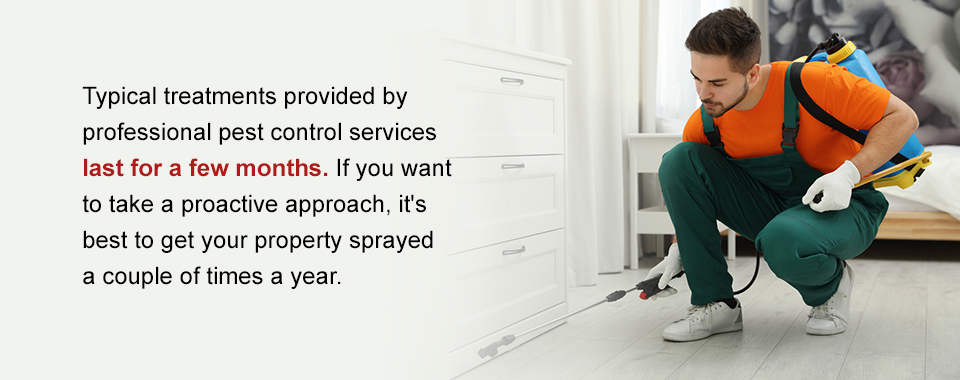Relied On Pest Control Clovis: Securing Your Building
Relied On Pest Control Clovis: Securing Your Building
Blog Article
Recognizing the Different Strategies to Bug Control: A Comprehensive Guide

Natural Insect Control Techniques
Using environment-friendly methods such as buddy planting and biological pest control is essential for successfully handling bugs in farming settings. Buddy growing includes expanding various crops in distance to discourage insects, improve nutrient uptake, and improve total crop health.
Organic bug control involves presenting natural killers or virus to manage pest populations. Ladybugs, for circumstances, prey on aphids, managing their numbers without the demand for chemical pesticides. An additional instance is making use of Bacillus thuringiensis (Bt), a microorganism that targets certain insect parasites while being safe to human beings, animals, and advantageous pests.
These environment-friendly approaches not only lower the reliance on artificial pesticides but likewise assist protect biodiversity and dirt health and wellness. By including natural parasite control methods right into agricultural methods, farmers can accomplish lasting pest management while reducing negative effect on the environment.

Chemical Pest Control Solutions
Along with natural parasite control techniques, the use of chemical parasite control options plays a substantial duty in effectively handling pest populaces in farming atmospheres. Chemical insect control services are developed to target particular bugs that may cause comprehensive damage to crops. These solutions typically have artificial chemicals that are made to eliminate insects quickly and successfully.
Among the vital advantages of chemical bug control services is their effectiveness in controlling insect invasions on a big scale. Farmers can use these solutions utilizing numerous techniques such as splashing, fumigation, or seed therapy to protect their crops from unsafe pests, weeds, and diseases. Additionally, chemical parasite control options are fairly simple to apply and can give rapid outcomes, helping farmers secure their yields and minimize economic losses.
Nevertheless, it is vital to make use of chemical bug control services sensibly to minimize possible negative impacts on the atmosphere, non-target microorganisms, and human health. Correct application techniques, adherence to safety and security standards, and normal monitoring are important to ensure the liable usage of chemical parasite control services in agricultural techniques.
Organic Insect Control Approaches
Biological bug control approaches leverage natural predators or microorganisms to handle parasite populations in farming settings successfully. One usual biological control approach is the intro of natural opponents, such as ladybugs or parasitical wasps, to target specific parasites.
An additional organic control method includes making use of microorganisms like infections, germs, or fungi to infect and kill parasites. These microbial agents can be sprayed on crops or presented into the dirt to combat numerous bugs without hurting useful bugs or other wild animals. Furthermore, the usage of scents to interrupt the breeding patterns of bugs is one more reliable biological control strategy. By hindering their reproduction, this technique assists to minimize insect populaces without the need for chemical intervention. Overall, biological insect control approaches supply a lasting and targeted service to pest management in agriculture.
Integrated Bug Monitoring (IPM)
Integrated Bug Monitoring (IPM) is a comprehensive method that integrates numerous parasite control approaches to properly manage and minimize pest populations in farming systems. IPM concentrates on long-term prevention of pests through a combination of biological, social, physical, and chemical control techniques. By integrating these various approaches, IPM intends to lower dependence on chemical pesticides, reduce ecological effect, and promote sustainable parasite administration practices.
One key aspect of IPM is using biological controls i thought about this such as all-natural predators, bloodsuckers, and microorganisms to regulate bug populations. This approach utilizes the power of nature to maintain a balance between insects you could look here and their natural adversaries without causing harm to the setting.
Furthermore, IPM entails social methods like plant habitat, rotation, and hygiene manipulation to create negative problems for bugs and disrupt their life process. Physical controls such as obstacles, catches, and mulches are likewise made use of to stop pest infestations.
Physical and mechanical Parasite Control Techniques
Making use of non-chemical techniques, such as physical and mechanical bug control techniques, is a critical element of extensive insect administration strategies, building upon the structure of Integrated Parasite Monitoring's alternative approach. Mechanical parasite control entails the use of physical obstacles or traps to avoid pests from accessing and damaging crops or frameworks. This approach can include methods like installing screens on home windows, making use of row covers in farming, or using sticky traps to catch pests.
Physical parasite control approaches, on the various other hand, emphasis on directly removing pests with physical means. As an example, making use of warm therapies to eliminate bed bugs or vacuuming up insects like ants or crawlers can be reliable means to handle invasions without using chemicals. By integrating these mechanical and physical insect control techniques into an Integrated Insect Administration plan, experts and people can minimize reliance on pesticides while still efficiently managing pest populaces and lessening damage.
Verdict

In addition to all-natural pest control techniques, the application of chemical insect control services plays a significant role in properly taking care of pest populaces in farming environments.One of the crucial benefits of chemical pest control remedies is their efficiency in regulating parasite invasions on a large scale.Integrated Parasite Administration (IPM) is an extensive method that combines different insect control approaches to effectively take care of and minimize pest populations in agricultural systems.Using non-chemical approaches, such as physical and mechanical pest control techniques, is an important element of extensive pest monitoring techniques, constructing upon the foundation of Integrated Parasite Monitoring's all natural approach. By integrating these mechanical and physical bug control strategies into an Integrated Pest Management plan, individuals and professionals can reduce reliance on chemicals while still properly handling pest populaces and lessening damages.
Report this page